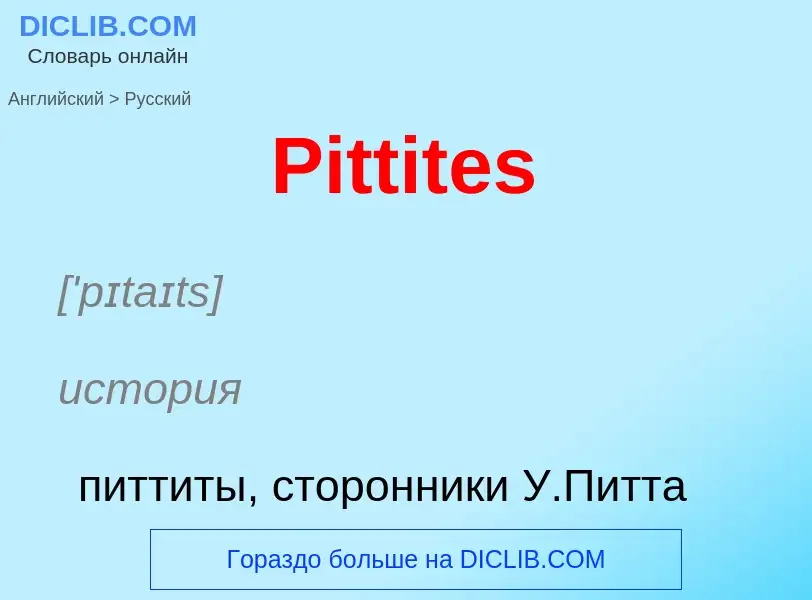Traducción y análisis de palabras por inteligencia artificial ChatGPT
En esta página puede obtener un análisis detallado de una palabra o frase, producido utilizando la mejor tecnología de inteligencia artificial hasta la fecha:
- cómo se usa la palabra
- frecuencia de uso
- se utiliza con más frecuencia en el habla oral o escrita
- opciones de traducción
- ejemplos de uso (varias frases con traducción)
- etimología
Tory party ‹principles› - traducción al
['pɪtaɪts]
история
питтиты, сторонники У.Питта Младшего [William Pitt, the Younger, 1759-1806]
['tɔ:rɪ,pɑ:tɪ]
общая лексика
партия тори
история
партия тори (возникла в конце 70-х - начале 80-х гг. 17 в.; выражала интересы наиболее реакционной части земельной аристократии и высшего духовенства англиканской церкви [Church of England]; в 30-х гг. 19 в. была преобразована в Консервативную партию [Conservative Party])
синоним
Смотрите также
['pitait]
существительное
история
сторонник Уильяма Питта Старшего
Definición
---
(СДПГ) , создана в 1869 на общегерманском рабочем съезде в Эйзенахе (руководители - В. Либкнехт и А. Бебель). В партии шла острая борьба между течениями [с нач. 20 в. три: ревизионистское, или правое (Э. Бернштейн, К. Легин, Ф. Эберт, Ф. Шейдеман, Г. Мюллер), центристское (К. Каутский, после 1910) и левое (К. Либкнехт, Р. Люксембург, К. Цеткин, Ф. Меринг, В. Пик), на основе которого образована в декабре 1918 КПГ. Находилась вне закона в 1878-90 и во время фашистской диктатуры (1933-45).
Wikipedia

The Tories were a loosely organised political faction and later a political party, in the Parliaments of England, Scotland, Ireland, Great Britain and the United Kingdom. They first emerged during the 1679 Exclusion Crisis, when they opposed Whig efforts to exclude James, Duke of York from the succession on the grounds of his Catholicism. Despite their fervent opposition to state-sponsored Catholicism, Tories opposed exclusion in the belief inheritance based on birth was the foundation of a stable society.
After the succession of George I in 1714, the Tories were excluded from government for nearly 50 years and ceased to exist as an organised political entity in the early 1760s, although it was used as a term of self-description by some political writers. A few decades later, a new Tory party would rise to establish a hold on government between 1783 and 1830, with William Pitt the Younger followed by Robert Jenkinson, 2nd Earl of Liverpool. The Whigs won control of Parliament in the 1831 election, which was fought largely on the issue of electoral reform. The Representation of the People Act 1832 removed the rotten boroughs, many of which were controlled by Tories and they were reduced to 175 MPs in the 1832 elections.
Under the leadership of Robert Peel, who issued a policy document known as the Tamworth Manifesto, the Tories began to transform into the Conservative Party. However, his repeal of the Corn Laws in 1846 caused the party to break apart; the faction led by Derby and Benjamin Disraeli became the modern Conservative Party, whose members are still commonly referred to as Tories.


![James, Duke of York]] painted in a Romanesque costume James, Duke of York]] painted in a Romanesque costume](https://commons.wikimedia.org/wiki/Special:FilePath/James, Duke of York - Romanesque.jpg?width=200)
![[[William Pitt the Younger]] [[William Pitt the Younger]]](https://commons.wikimedia.org/wiki/Special:FilePath/Pitt the Younger.jpg?width=200)
![Whigs]] Whigs]]](https://commons.wikimedia.org/wiki/Special:FilePath/Pretend3.jpeg?width=200)
